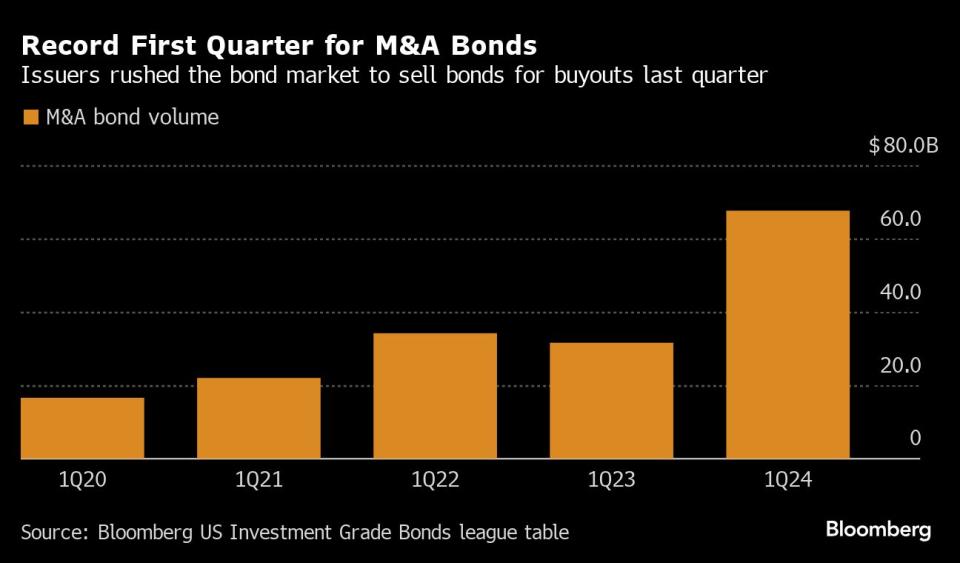Pipeline for Acquisition Financing Shrinks, in Boon for Credit
(Bloomberg) -- Companies have fewer acquisitions to refinance in longer-term debt markets now than they did a few months ago, which could help boost bond returns this year.
Most Read from Bloomberg
World’s Largest Nuclear Plant Sits Idle While Energy Needs Soar
Treasuries Hit as US Sales Struggle to Lure Buyers: Markets Wrap
New BYD Hybrid Can Drive Non-Stop for More Than 2,000 Kilometers
For Private Credit’s Top Talent, $1 Million a Year Is Not Enough
More than $67 billion worth of acquisition debt was sold in the first quarter — roughly double the volume seen in the same period in 2023 and 2022 — leaving at least $60 billion to be funded over the remaining nine months, according to filings and reports compiled by Bloomberg News. That pipeline includes mainly bridge loans — short-term debt used to help fund acquisitions that is later replaced by longer-term, less expensive corporate bonds.
Companies have rushed to refinance bridge loans this year ahead of the US presidential election in November, which might roil debt markets and boost borrowing costs. At the same time, investors have been eager to buy bonds to lock in relatively high yields before the Federal Reserve potentially starts to cut rates.
“Funding costs remain high relative to the past decade so issuance will necessarily slow to that which is required for corporate purposes and policy,” said Scott Kimball, chief investment officer at Loop Capital Asset Management. “This will be a tailwind for secondary markets because the opportunity to buy high quality corporate paper over 5% does not last indefinitely.”
Market technicals have held steady despite the glut of new offerings. Average risk premiums stand at 87 basis points over comparable US Treasuries — hovering around late 2021 levels, according to a Bloomberg index.
“Robust issuance hasn’t done anything to shake rock solid technicals,” said Winifred Cisar, global head of strategy at CreditSights. “Deals have gotten done at tight spreads/new issue concessions, order books are strong and life seems to be good if you are an IG issuer lately.”
Some of this year’s largest buyout financings have already wrapped up. That includes drugmaker Bristol Myers Squibb Co.’s Valentines Day bond sale — totaling $13 billion — to back its purchase of Karuna Therapeutics Inc. and RayzeBio Inc. A few days later, Cisco Systems Inc. sold $13.5 billion of bonds for its purchase of data services provider Splunk Inc. And a day later, biotech giant AbbVie Inc. sold $15 billion to fund acquisitions of ImmunoGen Inc. and Cerevel Therapeutics Holdings Inc.
“The market got a lot of the backlog of acquisition financing done in the first quarter,” said Teddy Hodgson, Morgan Stanley’s co-head of global investment-grade syndicate. “Our expectation is that there’s not going to be nearly the number of big jumbo M&A deals in the second quarter that we saw in the first quarter.”
Issuers have front-loaded bond sales this year largely due to the looming rematch between President Joe Biden and Donald Trump. “The election at the back end of the year is this obvious risk event,” said Hodgson. “Many issuers don’t want to be in a position where they have to do deals in the third or fourth quarter, in the event there is volatility because of the election.”
Expectations that the Fed will hold its benchmark rate higher for longer has also removed any incentive for borrowers to delay coming to market.
“Non-financial borrowers, six months ago were thinking, ‘We’ll wait until later in 2024 when the Fed has cut rates and rates have come down and so on and so forth’,” Hodgson said. “That clearly has gone in the other direction. And so, the incentive if you think about it, to wait, has kind of evaporated.”
While strategists still expect robust year-end volume for financings backing blue-chip buyouts, it’s looking more unlikely it will touch the $180 billion level that Wells Fargo & Co. had anticipated as of April. In comparison, around $130 billion was raised last year to fund acquisitions, Bloomberg-compiled data shows.
“There is still some to-be-financed M&A in the pipeline for the balance of this year,” said Maureen O’Connor, global head of high-grade debt syndicate at Wells Fargo, in an interview. “Whether or not it pops up in Q2 versus Q3 versus Q4, I think, is the bigger question.”
As more bridge loans get slotted into place to support M&A deals, those will have to be refinanced later too — most likely in 2025 as the facilities usually mature in 364 days. However, the lag between deal announcement and funding will make it tougher to clinch financings before year-end, according to Barclays Plc.
“Current M&A supply is near a record pace, but the pipeline looks fairly muted for the remainder of the year,” bank analysts led by Dominique Toublan wrote in an April note.
Most Read from Bloomberg Businessweek
©2024 Bloomberg L.P.




